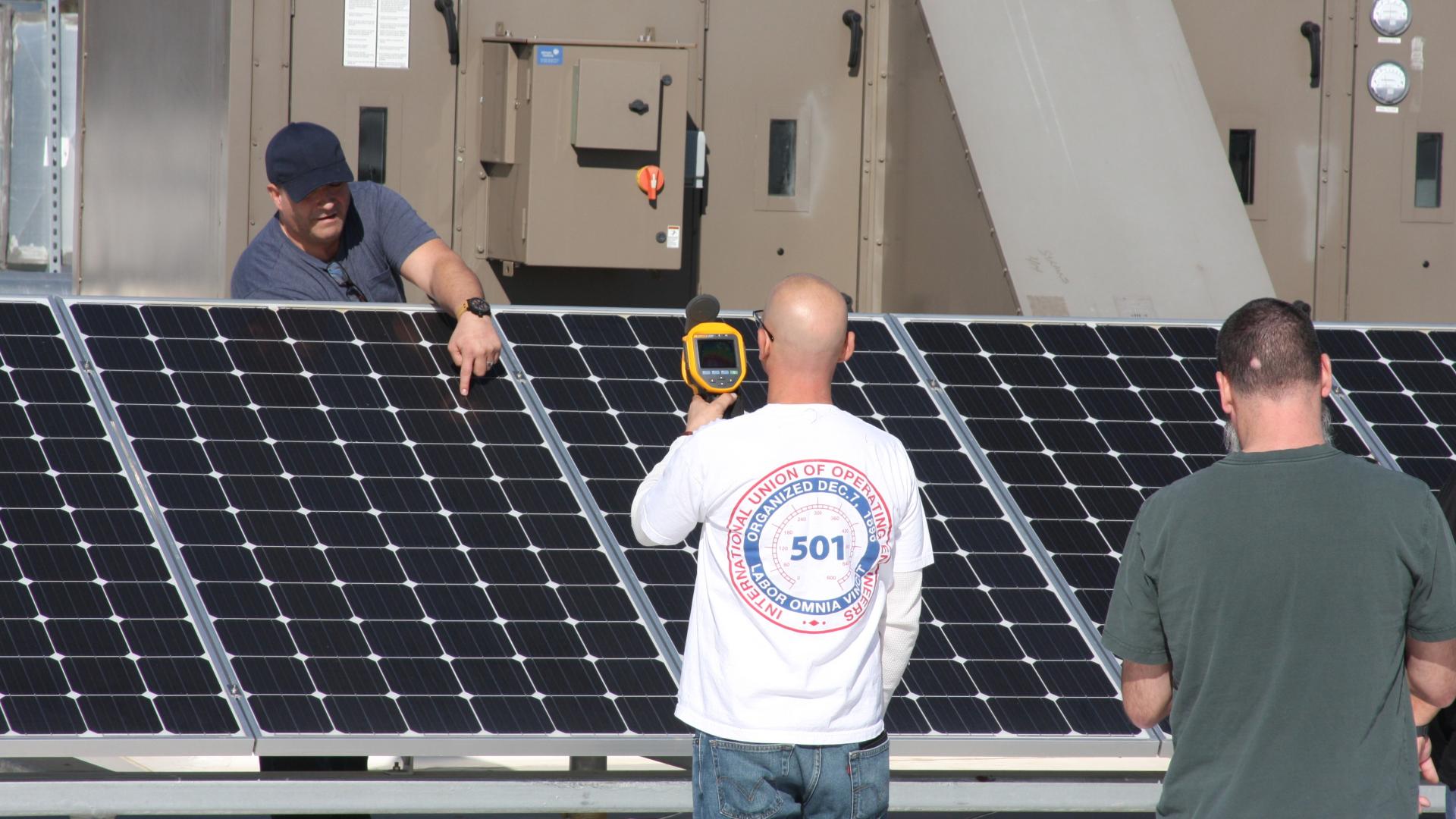Trade Unions Representing 1.5 Million American Workers Oppose Retroactive Solar Tariffs
Wednesday, Apr 19 2023

Members of the International Union of Operational Engineers (IUOE) assess solar equipment at the union’s training facility in Crosby, Texas. Photo courtesy of IUOE.
This week, Americans across the clean energy industry sprang to action as Congress threatened $1 billion in retroactive solar tariffs. A handful of lawmakers are using the Congressional Review Act (H.J. Res. 39) to repeal President Biden’s two-year moratorium on the enforcement of tariffs resulting from the Auxin anti-circumvention case.
This reprieve is a necessary bridge for the solar and storage industry as the Inflation Reduction Act goes to work for the economy and spurs domestic manufacturing across the country.
This week, clean energy trade associations, environmental groups such as the League of Conservation Voters and Sierra Club, and 417 solar companies all voiced their strong opposition to this harmful bill in letters to the Hill.
Now, the largest trade unions active in the U.S. solar and storage industry are joining the industry opposition.
The Laborers' International Union of North America (LIUNA) president Terry O’Sullivan sent a letter to Congress pointing to the positive effects of the Inflation Reduction Act and the disruptive nature of this legislation. LIUNA has more than 500,000 members who are trained to work in construction and energy industries where they build infrastructure projects, like utility-scale solar projects. LIUNA has been active in the renewable energy industry for more than a decade.
“By way of the Inflation Reduction Act (IRA), the Biden Administration has brought good-paying union construction jobs into the renewable industry,” wrote O’Sullivan. “These jobs are finally good jobs, with family-supporting wages and benefits. Repealing President Biden's moratorium, however, will bring several solar construction sites to a halt, leaving our members without a paycheck.”
“Our union has never seen this much solar construction work, and future construction work already on the books, within the renewable energy industry, and it is now all at risk if the CRA is passed,” O’Sullivan said.
The International Union of Operating Engineers and United Brotherhood of Carpenters and Joiners of America released a joint statement about the harm these actions would cause.
IUOE has more than 400,000 members and represents heavy equipment operators, mechanics, and surveyors in the construction industry, as well as stationary engineers who work in operations and maintenance in building and industrial complexes.
“Repealing President Biden’s Proclamation will result in retroactive duties and tariffs that would jeopardize 30,000 construction and 4,000 manufacturing jobs,” said James T. Callahan, General President of the International Union of Operating Engineers. “We are not prepared to stand by and let some partisan dispute eliminate Operating Engineers’ jobs and slow the deployment of clean energy.”
The Carpenters are one of the largest building trade unions with over half a million workers. They have an active solar workforce across the Midwest that install solar projects across all market segments.
“President Biden’s Proclamation saves Carpenters’ jobs and smooths the development of the domestic solar manufacturing industry. Today, we’re seeing the American manufacturing sector respond to incentives in the Inflation Reduction Act and develop homegrown solar modules,” said Carpenters Union General President Douglas J. McCarron. “Now is not the time to disrupt the solar industry and layoff thousands of union workers just as we’re getting a foothold in the burgeoning solar business.”
The District Council of Ironworkers for the state of California and Vicinity represent ironworkers across California, Nevada, Arizona, and Hawaii. They too sent a letter to lawmakers urging them to oppose the bill.
“Our District Council that is leading in the development of competitive, carbon-free power generation would be hard hit, and the growth of our renewable energy sector would suffer and stumble,” said David S. Osborne, President of the District Council of Ironworkers. “Such job destruction is counterproductive and unnecessary."
These union workers are a critical part of the solar and storage workforce, and as the union leaders write, those jobs are now at risk. In total, more than 30,000 solar jobs could be at risk, including 4,000 manufacturing jobs at a time when the industry is working hard to expand its domestic manufacturing presence.
As H.J. Res. 39 moves to the House floor for a vote next week, every member of Congress needs to understand the damage that this bill would cause across the solar and storage industry.
Members of Congress that want to support a clean energy future and domestic manufacturing must vote no on this harmful bill.